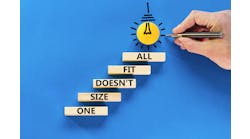Latest from Columnist
"There are moments which mark your life. Moments when you realize nothing will ever be the same and time is divided into two parts — before this, and after this." John Hobbes, a character played by Denzel Washington in the 1998 movie Fallen.
What have been your turning points, those points when a significant change occurred that altered the course of events in your life?
There have been historical events that changed all our lives. For the better, such as the toppling of the Berlin Wall on November 9, 1989. For the worse, the terror attacks on September 11, 2001. And, the event which occurred at different times for all of us (starting in the 1990s), that changed our lives in so many ways: the day we first accessed the World Wide Web.
(I recently saw a cartoon that humorously depicts our sense of "Before the Internet vs. After the Internet" with the caption Life Before Google. The drawing depicted a man and woman sitting in a living room, with the woman saying, "I just thought of something I want to know more about." And, the man replying, "That’s a damn shame.")
But, I’m more interested in your personal turning points.
Was it happenstance or a conscious decision?
Was it a crisis or an opportunity?
Did you have an idea that changed your world?
Did you create something that lead to a new business?
I know people who have suffered body trauma that altered their abilities for life. And, others who have been dramatically healed. There are any number of situations that may have been a crossroads for you.
I count several turning points in my life which include physical changes, emotional changes, and philosophical changes — events that definitely became a Before This/After This juncture.
Moving into a new house in a new neighborhood when I was 12 is the first significant one I recall. It gave me the opportunity to start over in a new school where I didn’t have a difficult-to-overcome notoriety as a wimp.
In my old neighborhood and school, I felt like William Thatcher, in the movie A Knight’s Tale, when jousting champion Count Adhemar said to him, "You have been weighed, you have been measured, and you have been found wanting." In my new house, I still had the same insecurities that got me bullied when I was younger (see my article Keep Your Power), but in the new school at least I didn’t have to vanquish an existing reputation as well. I was very aware of the differences between Before the Move and After the Move, and over the years I’ve pondered how my life might be different if this change never occurred.
Then there were the various mileposts of life, such as my 16th birthday and getting my driver’s license and enjoying my first taste of freedom. A year later at 17, I bought my first car and enjoyed more freedom, as I didn’t have to borrow my parents’ cars. And then the enormous freedom I enjoyed when I got my first apartment at age 19.
I have had a number of emotional turning points. I recall feeling like a prisoner in high school and needing change. I decided to run for the office of Student Council President. I was so desperate for some variation in my life that I decided if I didn’t win the election, I would ask my parents to let me move in with my aunt, so I could finish my senior year in another city. Fortunately, I won the election, because my parents would never have allowed me (nor my aunt for that matter) to move. As it turned out, I experienced the most amazing year where I learned many new things and enjoyed a huge boost in my self-confidence and sense of self-worth.
Losing my father to a stroke in my sophomore year of college was a huge loss emotionally. As I wrote in a previous article (Confessions of a Mr. Mom), I had just started getting along with my dad for the first time since I became a teenager. Over the years, there would be many occasions where I wished for his counsel, his wisdom, and his love. It was also a big philosophical turning point, because of Dad dying so young; I experienced a loss of (religious) faith that lasted for many years. It wasn’t until one of the biggest turning points in my life — having children and becoming a father myself — that my faith started to return.
As a writer, my biggest turning point came when I bought my first computer at age 28. Having the word-processing power of a computer increased my writing productivity immensely. Before owning a computer, when I worked on a typewriter, I never finished a project. I had stacks and stacks of manuscripts with corrections written in the margins, collecting dust, waiting to be retyped. After I acquired a computer with the power to edit, move paragraphs, and spell-check, I completed short stories, novels, and more. Buying that first computer even enabled me to go into business for myself.
One of my most difficult turning points was my divorce after 22 years of marriage. I lost my primary confidant; I became a single parent; I was dating again; I had time alone; and I was so depressed that I was challenged by everything. Seeking help, I saw a few different therapists, but I didn’t feel that any of them were helping me. I was also in denial that I had a problem other than the sadness associated with loss.
The real turning point of my divorce came a few years later, after a particularly painful ending to a relationship. I recognized that I had a pattern of pursuing poisonous relationships. I realized I had a problem; a problem I couldn’t understand. A problem for which I was determined to find an answer. I read and researched diligently until I finally had a "eureka moment" and identified the problem enough that I was able to find a therapist who could help me. Just knowing what the problem was became a clear demarcation point of Before/After for me. And, while there is no specific date at which it began to work, I learned in therapy how to change my life for the better.
What are some of your turning points? If you will, please share yours in the comments: the good and the bad; the intentional and the random; how they changed your life; what you learned; and what meaning you took from them.





